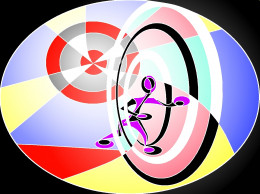Does two finite entities causing an infinite reaction challenge our definition o
Does two finite entities causing an infinite reaction challenge our definition of infinity?
Divide 10 by 3 or face two mirrors across from each other and two finite entities cause an infinite reaction. The universe is also deemed infinite but it too could conceivably be enabled from two or more as yet unknown finite entities interacting. In my view, that premise qualifies infinity more as hypothetical than as fact. Intuitively, we accept infinity is "no start, no end, and continues forever" but given our finite resources to comprehend infinity, is current science not relying more on a philosophical case of observation and reasoning, than on strictly scientific methodology?
The answer is in you question, ie finite infinite. Both are just words neither are reality, as is the symbol for infinity, it just the figure 8 on its side. ? Is infinity really big or really small? Is this not the same Q.
Yes, and that has implications. Abstracts are useful in developing academic disciplines, but until abstracts become tangible, they can be regarded as arbitrary outside of context, and that's where the line blurs between science, philosophy, and faith
infinite things always come from finite things don't they? 7 musical notes but how many combinations of those 7 notes are there? We call it music and it always seems new doesn't it? 7 note finite starting point creates infinite music. We have 10 base numerical system. so there are only 10 digits in our system. 0 ->9 yet when we combine these numbers we can create an infinite amount of different numbers from these 10 numerical characters.
Robin I play with 8 musical notes doe to doe add chords and their tones and the vibration will change add a shaky finger and that will change. What a person hears depending on how they hear how do you measure a musical note. Ie I like rock you might
continuous recombination of new and old combinations is indeed conceivably infinite. So, given an infinite universe could finite enabling entities be time, energy, and space? These have traditionally been deemed infinite no? And the paradox persists
I believe space is measurable. Scientists today say we have telescopes that can see the outer rim of the universe so there must be a finite limit to what we call space at least. Time and Energy? I don't know but seeming infinite is not infinite.
Having thought about this problem for a few days, I conclude that infinity cannot exist in the real world, except in mathematics. Big Bang theory cannot explain it even with gravitational waves added (not to say they try to). It is still only a word!
It seems we agree infinity is handy for hypothesizing about astrological physics, but in a strictly scientific context its definition is unclear. Cree's point re visible edge of the universe making space measurable is valid given current technology
250 chars is short, so I'm answering my own question in response to much appreciated discussion contributors. We seem to agree infinity is more hypothetical than scientific. Based on other analogies in which infinity can result from finite entities interacting, what appears to be endlessly vast time, space, and energy can conceivably exist within finite parameters.
Agree with Cree the big bang theory is incomplete. While Hubble space telescope and other technologies confirm an outward expansion of the stars from a visible central location, that is the extent to which support is tangible. Evidently, the edge of the universe at the furthest reaches of its expansion, as well as its theoretical origination point are visible, so within the confines of current technology we can observe what appears to be a start and end (albeit expanding)
Beyond that point, reasoning out answers with relative analogies becomes philosophical. For instance, can there be an edge, without a corresponding entity relative to that edge enabling it as distinctive? It remains a chicken\egg cyclical paradox. Many choose to embrace faith to seek comfort in accepting answers to such questions remain within the domain of an omnipotent overseer sitting in judgement of humanity. Some choose to incorporate worship of that concept into their lifestyles, while others are more neutral and await discovery of new information.
Summary: Science clarifies answers by defining parameters within which something is either demonstrably true or untrue. Very understandable. Philosophy can emulate the scientific method, but upon reaching an indisputable synthesis from its preceding reconciliation of thesis versus antithesis, then at that point philosophy has become science. Many philosophical questions remain at the thesis versus antithesis phase, and a debate about the relative merits or demerits of infinity's definition will likely be no different. At that point, philosophy has much in common with faith in that one accepts one can go so far and no further with current information.
Does faith discourage questioning current knowledge? Possibly for some, but not everyone might otherwise have been inclined to give much philosophical or scientific thought to such questions anyway. I embrace any faith which has humanitarianism as its mission, but personally choose to follow science and philosophy. However, wide open questions abound so science may be convincing, but logically philosophy and faith have plenty of fertile ground to thrive upon.
Related Discussions
- 55
Has the Universe been around forever? No, therefore there is a God
by chasemillis 13 years ago
Matter cannot be created or destroyed. Ok that's easy.So that means that the Universe has been around forever. That would be great, except there are no real world examples of infinity. If infinity is not a quality of anything in the Universe, how can it be a quality of the Universe? It doesn't...
- 33
Evaluate: The universe must be finite, because if it were infinite...
by Eric Newland 13 years ago
...there would be no gravity.My reasoning comes from the Shell Theorem:http://en.wikipedia.org/wiki/Shell_theoremSimply put, a spherical shell exerts no net gravitational force on objects inside it. Likewise, there will be no net gravitational force on a point at the very center of a solid...
- 46
How big is the universe?
by Infinite712 14 years ago
That is, how much matter do you think there is? Do you think that the universe is finite or infinite? Is there never ending "stuff" or a finite amount that's surrounded by absolutely nothing. I don't know what this concept of "nothing" is supposed to be, so I think that an...
- 5
Can any religious scriptures explain whether the universe is finite or infinite?
by gaurav oberoi 10 years ago
Can any religious scriptures explain whether the universe is finite or infinite?
- 3
Does the universe have an end?
by andrew savage 11 years ago
Does the universe have an end?
- 26
What Is Reality?
by TruthDebater 15 years ago
What do you believe reality is? If reality is based on real things, how is it that somes reality is based or guided by things that can't be proven or observed? What is real belief and reality?








